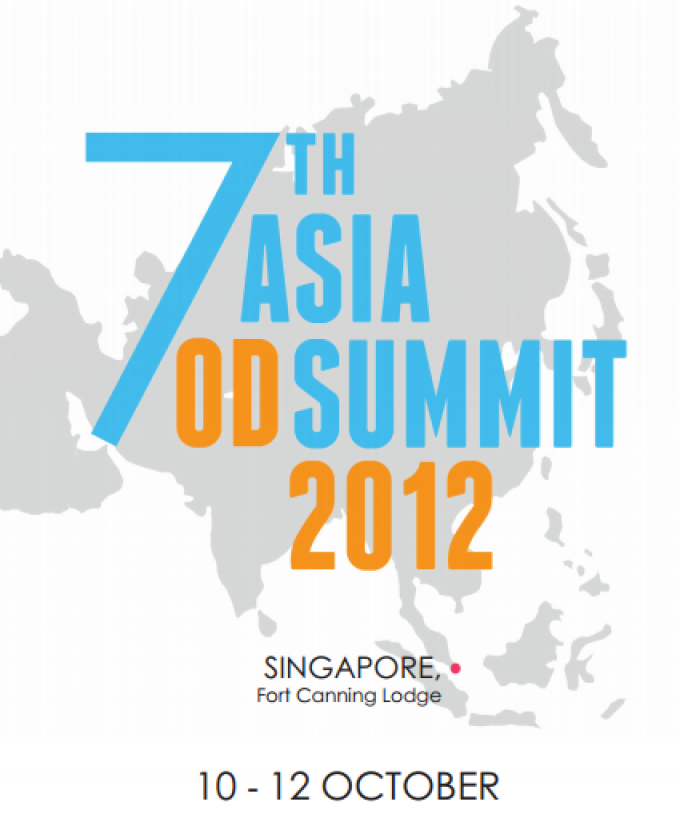
Engaging and Building OD Capability for Greater Impact – Throughts from the 7th Asia OD Summit
How can OD practitioners do their best work in powerful and sustainable ways and make a deeper impact on the organisations with which they interact? This was the theme at the 7th Asia OD Summit held in Singapore last week. In attendance were 180 delegates from 17 countries, discussing and sharing leading OD practices. There two plenary sessions; one with Dr. Mee Yan Cheung-Judge, creator and Director of Quality and Equality Ltd, and the other with Mr Geoff Bullman, external consultant and author of six business books.
In “The Future of OD,” Dr. Mee Yan Cheung-Judge encouraged the audience to become a desirable commodity. This will require OD to be externally and business focused. All the methodologies and theories in the world will be rendered useless if OD practitioners do not have “street-credibility” with the C-level. They must work in the strategic sphere and have metrics to prove their worth.
The way to increase our impact as OD practitioners is through the use of power and politics. For many this concept can be confronting. Dr Cheung-Judge shared that many see “power and politics” as being dirty and underhanded; and it can be if it is used for egotistical gain, rather than for achieving outcomes. Whether we like it or not, organisations are political systems, not rational systems. Dr Cheung-Judge suggested OD practitioners need to be politically savvy by first cumulating a sufficient power base and secondly, by learning a variety of power strategies to achieve outcomes.
The main insight gained from Mr Geoff Bellman’s presentations on the “Heart of Consulting” was the importance of being aware of how others view the world. A common mistake of consultants is to provide a solution based on how they see the world. Many forget to take into account the WIIFM (“what’s in it for me”) of those being impacted by change. Remember: my reality is not your realty. If you understand your audience and how they view the situation, there is significantly greater chance of reducing resistance.
On Day 2, we were privileged to hear from the person that in my view was the most compelling speaker of the event. Mr Clarence Ti, Chief Executive, Vital (Singapore Ministry of Finance) shared his experiences in leading significant change within his organsiation. Within two years, he changed the engagement scores at Vital from being one of the worst in the public sector to one of the best. However, this was not what made him impressive in my opinion – it was his unique approach to turning the organisation around. These initiatives included:
- Recruiting a media specialist to solve the issue of attrition: Vital had been an environment in which only complaints were heard. The media specialist searched the organisation to find out what was being done right and published small stories both in public media as well as internally. Staff started to feel proud about where they worked.
- Asking staff to consider work to be their sixth priority in their lives. He saw that family and other commitments would be more highly rated. This resulted in staff realising their leaders are there for them and will support them through difficulties.
- Writing letters: over two years Clarence has written 138 letters. These are to individuals or the organisation as a whole. They are an effective way of communicating with staff and showed them he was listening. He read two letters that demonstrated sincerity as well as inspiring staff to see the bigger picture. In my opinion, they were very powerful letters.
Mr Ti’s efforts have resulted in not only significant improvement of Vital’s engagement scores but also in additional discretionary effort from his staff.
Much was covered over the three days and I have only focused on the highlights of the main speakers. In addition to the plenary sessions, there were a number of breakout sessions run concurrently, allowing for more in-depth discussions on different topics. The key points I took away from the conference were:
- The role of OD is to be facilitators, not experts. We need to help our “clients” look at data and consider ALL the different meanings, not just the one they see from their point of view
- Complex change can be nudged, not directed. Consider the whole system (ie organisation, people, technology, environment, etc.) when looking at change solutions and deal with the ambiguity
The 7th Asia OD Summit was thought provoking and I enjoyed meeting and sharing ideas with other OD practitioners from across the Asia Pacific region.
Next year’s 8th Asia OD Summit will be held in the Philippines in 2013.
